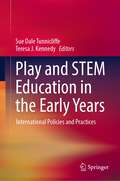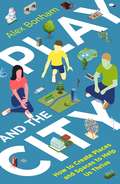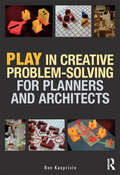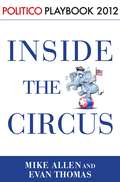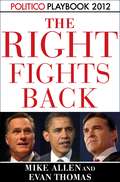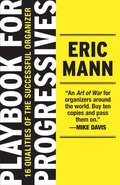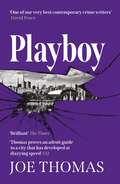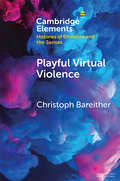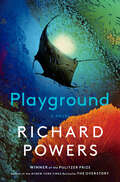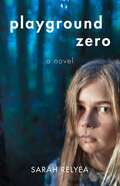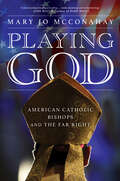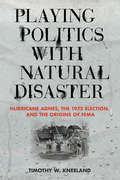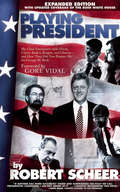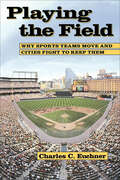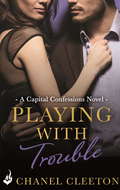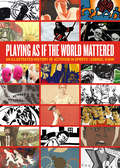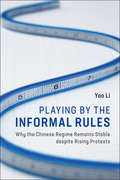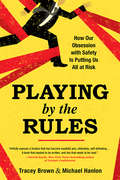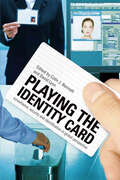- Table View
- List View
Play and STEM Education in the Early Years: International Policies and Practices
by Sue Dale Tunnicliffe Teresa J. KennedyThis edited book provides an overview of unstructured and structured play scenarios crucial to developing young children’s awareness, interest, and ability to learn Science, Technology, Engineering and Mathematics (STEM) in informal and formal education environments. The key elements for developing future STEM capital, enabling children to use their intuitive critical thinking and problem-solving abilities, and promoting active citizenship and a scientifically literate workforce, begins in the early years as children learn through play, employing trial and error, and often investigating on their own.Forty-seven STEM experts come together from 16 countries (Argentina, Australia, Belgium, Canada, England, Finland, Germany, Israel, Jamaica, Japan, Malta, Mauritius, Mexico, Russia, Sweden, and the USA) and describe educational policies and experiences related to young learners 3–4 years of age, as well as students attending formal-nursery school, early primary school, and the early years classes post 5 years of age.The book is intended for parents seeking to provide STEM activities for their children at home and in playgroups, citizen scientists seeking guidance to provide children with quality educational activities, daycare practitioners providing educational structures for young children from birth to formal education, primary school teachers and preservice teachers seeking to teach preschool, kindergarten or children typically aged 5–8 years old in grades 1–3, as well as researchers and policy makers working in science didactics with small children.
Play and the City: How to Create Places and Spaces To Help Us Thrive
by Alex BonhamPlay is essential, for children but also adults. It's how we relax and revitalise ourselves, build and maintain friendships, try new things, learn and innovate.Cities have always been sites of play, bringing people together and pushing the boundaries of what is humanly possible. And now we need our cities to encourage and facilitate play of all kinds more than ever. If we want a world for our children to play in, we need to have a go at doing things differently. A city that is enjoyable to live in - that provides welcoming spaces, plentiful resources, and an attitude of 'yes, you can' - is a playful city. A city that is good for eight-year-olds as well as eighty-year-olds is a city that's good for all of us. By looking at how different cities across space and time have sought to encourage and facilitate play, Bonham shows us how to conceptualise our own contemporary city as a game, and encourages us to become participants rather than spectators.Play the city! Get involved, make a difference and help to bring your city back to life. There is help here to identify opportunities, build a team of friends and allies, take part - and win! It's time to make your move.
Play and the City: How to Create Places and Spaces To Help Us Thrive
by Alex BonhamPlay is essential, for children but also adults. It's how we relax and revitalise ourselves, build and maintain friendships, try new things, learn and innovate.Cities have always been sites of play, bringing people together and pushing the boundaries of what is humanly possible. And now we need our cities to encourage and facilitate play of all kinds more than ever. If we want a world for our children to play in, we need to have a go at doing things differently. A city that is enjoyable to live in - that provides welcoming spaces, plentiful resources, and an attitude of 'yes, you can' - is a playful city. A city that is good for eight-year-olds as well as eighty-year-olds is a city that's good for all of us. By looking at how different cities across space and time have sought to encourage and facilitate play, Bonham shows us how to conceptualise our own contemporary city as a game, and encourages us to become participants rather than spectators.Play the city! Get involved, make a difference and help to bring your city back to life. There is help here to identify opportunities, build a team of friends and allies, take part - and win! It's time to make your move.
Play in Creative Problem-solving for Planners and Architects
by Ron KasprisinIn Play in Creative Problem-solving for Planners and Architects, "play" is defined, explored and demonstrated as a critical catalyst in creative problem-solving processes. The book defines the current psychological research into play and creative problem-solving, explores the necessary integration of the two, and exemplifies for students and practitioners the use of play in creative endeavors; and the role that play serves in separating linear from creative problem-solving approaches. Play is explored regarding its elements (tools, skills, environment), characteristics (a free activity without failure) and attitude as it relates to and activates the creative process with the focus on urban design, planning, architecture, and landscape architecture. The book re-establishes the whole mind-body thinking process of play as a means of object-learning; to provide designers and planners with alternative ways of design-thinking; and to challenge the over-utilization of digital technologies in creative processes. Creative problem-solving requires an appreciation for ambiguity, uncertainty of outcome, complexity that leads to the discovery of novelty and innovation. The book incorporates examples and exercises in play activities related to the design and planning fields, and exercises related to play-tools and skills for students and professionals. It also defines terms used in play and creativity psychology; provides examples and structure for play and creative problem-solving activities; describes the type and use of appropriate play-tools; contains an extensive bibliography on play and creative problem-solving texts; and provides significant illustrations making it fundamental reading for students and professionals in urban design and planning fields.
Playbook 2012: Inside the Circus--Romney, Santorum and the GOP Race (POLITICO Inside Election #2012)
by Evan Thomas Mike AllenTwo of America's most perceptive political reporters join forces for an unprecedented behind-the-scenes look at the race for the White House in POLITICO's Playbook 2012, a series of four instant digital books on the 2012 presidential election. The second edition, Inside the Circus, pulls back the curtain on the pursuit of the Republican nomination, as operatives jockey for position and strategists vie to fashion a message that can win over all factions of the fractious GOP. Over the course of a long winter and into the spring, the contest for the 2012 Republican presidential nomination gathered steam and bubbled over with drama. At times it seemed more like a soap opera or reality show than a political campaign. Inside the Circus, the latest real-time digital dispatch from acclaimed political correspondent Mike Allen and award-winning journalist and author Evan Thomas, chronicles each turn in this endlessly surprising race with reporting straight from the campaign war rooms of Mitt Romney, Rick Santorum, and the other GOP contenders. What was the thinking inside the Romney brain trust as what was once expected to be an easy ride to the nomination turned into what some have called a "long slog"? How did Newt Gingrich throw the preternaturally poised Romney off his game in South Carolina--and who convinced the former Massachusetts governor it was time to start punching back? Why were the other campaigns caught flat-footed by the rise of Rick Santorum and what does his unlikely ascent mean for the prospect of a brokered convention? From the Iowa caucuses to Super Tuesday and beyond, Allen and Thomas answer all the questions the headlines, polls, and delegate counts can't address. The stakes are high, the plotlines are still unfolding, and Inside the Circus is your fly-on-the-wall guide to the most fascinating Republican presidential race in recent memory.
Playbook 2012: The Right Fights Back (Politico Inside Election #2012)
by Evan Thomas Politico Mike AllenTwo of America's most perceptive political reporters join forces for an unprecedented behind-the-scenes look at the race for the White House in POLITICO's Playbook 2012, a series of four instant digital books on the 2012 presidential election. The first edition, The Right Fights Back, follows the campaign for the Republican presidential nomination. The battle for the 2012 Republican presidential nomination promises to be one of the most hotly contested and closely fought in recent memory, as establishment Republicans, Tea Party favorites, and dark horse insurgents vie to take on President Obama in the November election. In The Right Fights Back, Mike Allen, chief White House correspondent for POLITICO, and Evan Thomas, the award-winning journalist and author of Robert F. Kennedy and The War Lovers, chronicle the dramatic events of this historic campaign as it unfolds. With exclusive real-time reporting from the campaign trail, The Right Fights Back provides detail, color, and in-depth analysis that take readers beyond the hourly headlines and commentary. From the role of Super PACS and conservative interest groups to the clashes of personality and policy that will define the race to capture the GOP nomination, this is a history-as-it-happens account of the resurgent American right at the crossroads.
Playbook for Progressives
by Eric MannAn organizing manifesto for the twenty-first century, Playbook for Progressives is a must-have for the activist's tool kit. This comprehensive guide articulates pragmatically what is required in the often mystifying and rarely explained on-the-ground practice of organizing. Here, Eric Mann distills lessons he learned from over forty years as an organizer, as well as from other organizers within the civil rights, labor, LGBT, economic justice, and environmental movements.From the Trade Paperback edition.
Playbook for Progressives: 16 Qualities of a Successful Organizer
by Eric MannAn organizing manifesto for the twenty-first century, Playbook for Progressives is a must-have for the activist's tool kit. This comprehensive guide articulates pragmatically what is required in the often mystifying and rarely explained on-the-ground practice of organizing. Here, Eric Mann distills lessons he learned from over forty years as an organizer, as well as from other organizers within the civil rights, labor, LGBT, economic justice, and environmental movements.
Playboy (São Paulo Quartet #3)
by Joe ThomasMAIL ON SUNDAY THRILLER OF THE MONTH São Paulo, 20 March 2016 A campaign for the impeachment of President Dilma Rousseff is in full swing, yet 100,000 people take to Avenida Paulista in Sao Paulo in her support.On the same day, a young man from a wealthy family is murdered. Detective Mario Leme discovers the body. Two Military Policemen confront him.They strongarm him into the back of an SUV. Set against the backdrop of the biggest political corruption scandal in Brazilian history, Playboy is the story of Leme's attempt to clear his name, and find the young man's killer. Leme's investigation runs right through Sao Paulo society, from the bottom, to the very top and has implications far beyond. And the fight to prove his innocence might just cost Leme his life. A stylish, taut, and atmospheric novel in the hardboiled tradition of American noir, Playboy is a thrilling examination of the seething, violent street life of Sao Paulo and the political convulsions of contemporary Brazil. PRAISE FOR JOE THOMAS 'Brilliant' The Times 'Feverish energy' Guardian 'Wonderfully vivid' Mail on Sunday'Sophisticated, dizzying' GQ'Vivid and visceral' The Times'Superbly realised vivid and atmospheric' Guardian'Original' Mail on Sunday'A stylish, atmospheric treat an inspired blend of David Peace and early Pinter' Irish Times 'Sparse, energetic, fragmented prose' The Spectator 'Vibrant, colourful, and complex' Irish Independent 'Stylish, sharp-witted, taut. A must for modern noir fans' NB Magazine 'Definitive confident and energetic' Crime Time 'Brilliant manic energy' Jake Arnott 'Wildly stylish and hugely entertaining' Lucy Caldwell 'Vivid, stylish, funny' Mick Herron 'Gripping, fast-paced, darkly atmospheric' Susanna Jones 'Snappy, thoughtful, moving' John King 'Exciting, fresh, incredibly assured' Stav Sherez 'Happy days!' Mark Timlin 'Utterly brilliant' Cathi Unsworth 'Had James Ellroy and David Peace collaborated on a novel they'd have written something like this' Paul Willets
Playboy (São Paulo Quartet #3)
by Joe ThomasMAIL ON SUNDAY THRILLER OF THE MONTH São Paulo, 20 March 2016 A campaign for the impeachment of President Dilma Rousseff is in full swing, yet 100,000 people take to Avenida Paulista in Sao Paulo in her support.On the same day, a young man from a wealthy family is murdered. Detective Mario Leme discovers the body. Two Military Policemen confront him.They strongarm him into the back of an SUV. Set against the backdrop of the biggest political corruption scandal in Brazilian history, Playboy is the story of Leme's attempt to clear his name, and find the young man's killer. Leme's investigation runs right through Sao Paulo society, from the bottom, to the very top and has implications far beyond. And the fight to prove his innocence might just cost Leme his life. A stylish, taut, and atmospheric novel in the hardboiled tradition of American noir, Playboy is a thrilling examination of the seething, violent street life of Sao Paulo and the political convulsions of contemporary Brazil. PRAISE FOR JOE THOMAS 'Brilliant' The Times 'Feverish energy' Guardian 'Wonderfully vivid' Mail on Sunday'Sophisticated, dizzying' GQ'Vivid and visceral' The Times'Superbly realised vivid and atmospheric' Guardian'Original' Mail on Sunday'A stylish, atmospheric treat an inspired blend of David Peace and early Pinter' Irish Times 'Sparse, energetic, fragmented prose' The Spectator 'Vibrant, colourful, and complex' Irish Independent 'Stylish, sharp-witted, taut. A must for modern noir fans' NB Magazine 'Definitive confident and energetic' Crime Time 'Brilliant manic energy' Jake Arnott 'Wildly stylish and hugely entertaining' Lucy Caldwell 'Vivid, stylish, funny' Mick Herron 'Gripping, fast-paced, darkly atmospheric' Susanna Jones 'Snappy, thoughtful, moving' John King 'Exciting, fresh, incredibly assured' Stav Sherez 'Happy days!' Mark Timlin 'Utterly brilliant' Cathi Unsworth 'Had James Ellroy and David Peace collaborated on a novel they'd have written something like this' Paul Willets
Players in the Public Policy Process
by Herrington J. BryceThis book carefully develops the perspective of nonprofit organizations as social capital assets and agents of public policy within a principal-agent framework. It shows the practical as well as managerial and marketing advantages of such an approach, one that can lead to serious questions about many of the existing views that all nonprofits result from market or government failure. Bryce provides a more positive, cross-national and inclusive perspective on these organizations that applies across all of their disciplines and in developed or developing countries alike.
Playful Virtual Violence: An Ethnography of Emotional Practices in Video Games (Elements in Histories of Emotions and the Senses)
by Christoph BareitherViolence in video games has been a controversial object of public discourse for several decades. The question of what kind of emotional experiences players enact when playing with representations of physical violence in games has been largely ignored however. Building upon an extensive ethnographic study of players' emotional practices in video games, including participant observation in online games, qualitative interviews, an analysis of YouTube videos and gaming magazines since the 1980s, this Element provides new insights into the complexity and diversity of player experiences and the pleasures of playful virtual violence. Instead of either defending or condemning the players, it contributes foundational, unprejudiced knowledge for a societal and academic debate on a critical aspect of video gaming. This title is also available as Open Access on Cambridge Core.
Playground
by Richard PowersFour lives are drawn together in a sweeping, panoramic new novel from Richard Powers, showcasing the Pulitzer Prize–winning author of The Overstory at the height of his skills. Twelve-year-old Evie Beaulieu sinks to the bottom of a swimming pool in Montreal strapped to one of the world’s first aqualungs. Ina Aroita grows up on naval bases across the Pacific with art as her only home. Two polar opposites at an elite Chicago high school bond over a three-thousand-year-old board game; Rafi Young will get lost in literature, while Todd Keane’s work will lead to a startling AI breakthrough. <P><P> They meet on the history-scarred island of Makatea in French Polynesia, whose deposits of phosphorus once helped to feed the world. Now the tiny atoll has been chosen for humanity’s next adventure: a plan to send floating, autonomous cities out onto the open sea. But first, the island’s residents must vote to greenlight the project or turn the seasteaders away. <P><P> Set in the world’s largest ocean, this awe-filled book explores that last wild place we have yet to colonize in a still-unfolding oceanic game, and interweaves beautiful writing, rich characterization, profound themes of technology and the environment, and a deep exploration of our shared humanity in a way only Richard Powers can. <p> <b>New York Times Bestseller</b>
Playground Zero: A Novel
by Sarah RelyeaIt’s the season of siren songs and loosened bonds―as well as war, campaign slogans, and assassination. At the height of the Vietnam War protests, Washington lawyer Tom Rayson uproots his family for the freewheeling city of Berkeley. While Tom pursues a romance with a sexy colleague in the Marin County woods, Marian joins a peace party that’s running a Black Panther for president and meets the Berkeley revolution. But for young Alice, her parents’ liberating forays become a blind leap in a city marked by beauty and social change―and for a girl, that’s no Summer of Love. Feeling estranged from her family, Alice embraces the moment and falls in with Jim and Valerie Dupres. Jim and Valerie have been learning the ropes on Telegraph Avenue, cadging meals at a nearby communal house and camping out in People’s Park. Soon they’re confronting National Guardsmen. As family and school fade away in a tear-gas fog, Alice feels an ambiguous freedom. Caught up in a rebellion that feels equally compelling, scary, and absurd, Alice could become a casualty—or she could defy the odds and become her own person. One thing is sure: there’s no going back.
Playing God: American Catholic Bishops and The Far Right
by Mary Jo McConahay&“A fascinating, investigative dive . . . both alarming and enlightening.&” — Jane Mayer, author of Dark Money The definitive account of how a group of American Catholic bishops are using &“dark money&” and allying with ultra-right evangelicals in an attempt to remake America . . . Seasoned Catholic journalist and former war correspondent Mary Jo McConahay tells the story of how the United States Conference of Catholic Bishops have become one of the most formidable and reactionary forces in America — by campaigning to alter democratic institutions under the guise of religious liberty, and allying with major right-wing contributors such as the Kochs. In fact, many of the bishops—two-hundred and twenty-nine men, almost all white and beyond middle age—are such staunch opponents of Pope Francis that some US Catholics fear a schism with Rome. The influence of these bishops can be traced in recent news stories—such was when they maneuvered to deny the Eucharist to pro-abortion politicians like President Biden. With their lay partners, the bishops also help shepherd cases into the Supreme Court that change the law of the land, as with Roe v. Wade. But as McConahay details, that&’s just the tip of the iceberg. In an investigation reminiscent of Jane Mayer&’s Dark Money, she uncovers an ominous and long-term political strategy of attacking secular, liberal democracy by waging war on democratic norms and institutions.
Playing Oppression: The Legacy of Conquest and Empire in Colonialist Board Games
by Mary Flanagan Mikael JakobssonA striking analysis of popular board games&’ roots in imperialist reasoning—and why the future of play depends on reckoning with it.Board games conjure up images of innocuously enriching entertainment: family game nights, childhood pastimes, cooperative board games centered around resource management and strategic play. Yet in Playing Oppression, Mary Flanagan and Mikael Jakobsson apply the incisive frameworks of postcolonial theory to a broad historical survey of board games to show how these seemingly benign entertainments reinforce the logic of imperialism.Through this lens, the commercialized version of Snakes and Ladders takes shape as the British Empire&’s distortion of Gyan Chaupar (an Indian game of spiritual knowledge), and early twentieth-century &“trading games&” that fêted French colonialism are exposed for how they conveniently sanitized its brutality while also relying on crudely racist imagery. These games&’ most explicitly abhorrent features may no longer be visible, but their legacy still lingers in the contemporary Eurogame tendency to exalt (and incentivize) cycles of exploration, expansion, exploitation, and extermination.An essential addition to any player&’s bookshelf, Playing Oppression deftly analyzes this insidious violence and proposes a path forward with board games that challenge colonialist thinking and embrace a much broader cultural imagination.
Playing Politics with Natural Disaster: Hurricane Agnes, the 1972 Election, and the Origins of FEMA
by Timothy W. KneelandHurricane Agnes struck the United States in June of 1972, just months before a pivotal election and at the dawn of the deindustrialization period across the Northeast. The response by local, state, and national officials had long-term consequences for all Americans. President Richard Nixon used the tragedy for political gain by delivering a generous relief package to the key states of New York and Pennsylvania in a bid to win over voters. After his landslide reelection in 1972, Nixon cut benefits for disaster victims and then passed legislation to push responsibility for disaster preparation and mitigation onto states and localities. The impact led to the rise of emergency management and inspired the development of the Federal Emergency Management Agency (FEMA).With a particular focus on events in New York and Pennsylvania, Timothy W. Kneeland narrates how local, state, and federal authorities responded to the immediate crisis of Hurricane Agnes and managed the long-term recovery. The impact of Agnes was horrific, as the storm left 122 people dead, forced tens of thousands into homelessness, and caused billions of dollars in damage from Florida to New York. In its aftermath, local officials and leaders directed disaster relief funds to rebuild their shattered cities and reshaped future disaster policies.Playing Politics with Natural Disaster explains how the political decisions by local, state, and federal officials shaped state and national disaster policy and continues to influence emergency preparedness and response to this day.
Playing President: My Close Encounters with Nixon, Carter, Bush I, Reagan, and Clinton—and How They Did Not Prepare Me for George W. Bush
by Robert ScheerReflections on, and interviews with, US presidents from Nixon to George W. Bush, from &“one of the best reporters of our time&” (Joan Didion, New York Times–bestselling author of The White Album). Robert Scheer&’s interviews with and profiles of US presidents have shaped journalism history. Scheer developed close journalistic relationships with Richard Nixon, Jimmy Carter, Ronald Reagan, Bill Clinton, and George H. W. Bush, and his reporting on them had a tangible impact on national debate—with examples including the famed 1976 Playboy interview in which then-candidate Jimmy Carter admitted to have lusted in his heart; and the 1980 interview with the Los Angeles Times during which the senior Bush confessed to Scheer his dream of a &“winnable nuclear war.&” In Playing President, Robert Scheer offers an unparalleled insight into the presidential mind, analyzing administrations from Nixon to George W. Bush, offering insights that will surprise the reader—particularly those with rigid preconceptions about the decision-making processes of our leaders. Also included are reprints of Scheer&’s famous presidential interviews, along with previously unpublished interview transcripts and select writings.
Playing The Field: Why Sports Teams Move and Cities Fight to Keep Them
by Charles C. Euchner“Details how owners . . . have shamelessly played cities against one another to get sweetheart deals for their stadiums.” —Sports IllustratedCan a sports franchise “blackmail” a city into getting what it wants—a new stadium, say, or favorable leasing terms—by threatening to relocate? In 1982, the owners of the Chicago White Sox pledged to keep the team in Chicago if the city approved a $5-million tax-exempt bond to finance construction of luxury suites at Comiskey Park. The city council approved it. A few years later, when Comiskey Park was in need of renovation, the owners threatened to move the team to Florida unless a new stadium was built. A site was chosen near the old stadium, property condemned, residents evicted, and a new stadium built. “We had to make threats,” the owners said. “If we didn't have the threat of moving, we wouldn’t have gotten the deal.”Sports is not a dominant industry in any city, this book points out, yet it receives the kind of attention one might expect to be lavished on major producers and employers. In Playing the Field, Charles Euchner examines the relationships between Los Angeles and the Raiders, Baltimore and the Colts and the Orioles, and Chicago and the White Sox, arguing that, in the absence of public standards for equitable arbitration between cities and teams, the sports industry has the ability to steer negotiations in a way that leaves cities vulnerable. He reveals what lies behind this leverage—and what that says about the urban political process.
Playing With Trouble: Capital Confessions 2 (Capital Confessions #2)
by Chanel CleetonFrom the author of Next Year In Havana, a Reese Witherspoon's Book Club pick!Lovers of Scandal and House of Cards, and fans of Kristen Proby, and Lauren Layne will be utterly seduced by this spectacular series. Prepare to be addicted to the love stories, seduction, secrets and lies in the city of scandal...Welcome to Washington, D.C., city of scandal, where no secret stays hidden for long... Blair Reynolds was going to be the ultimate politician's wife - until she caught her fiance cheating on their wedding day. Vowing to make a fresh start Blair enrols in Law School, ready to buckle down. Unless a hot professor gets in the way... Graydon Canter had it all. A flying career, a fortune, and a spot on all the 'Thirty under Thirty' lists - until his rocky personal life threatened everything. Teaching law is a chance to get his life back on track. As long as nothing - and no one - trips him up. When Blair and Gray are thrown together in the classroom, their electric attraction is impossible to ignore. Gray needs to stay away from scandal, and Blair's never been a rule breaker. They're playing with trouble - but maybe such passion is worth the risk? Don't miss Book One in the Capital Confessions series, Flirting With Scandal, and look out for the next tantalising instalment, Falling For Danger.
Playing as if the World Mattered: An Illustrated History of Activism in Sports
by Gabriel KuhnThe world of sports is often associated with commercialism, corruption, and reckless competition. Liberals have objected to sport being used for political propaganda, and leftists have decried its role in distracting the masses from the class struggle. Yet, since the beginning of organized sports, athletes, fans, and officials have tried to administer and play it in ways that strengthen, rather than hinder, progressive social change. From the workers' sports movement in the early 20th century to the civil rights struggle transforming sports in the 1960s to the current global network of grassroots sports clubs, there has been a glowing desire to include sports in the struggle for liberation and social justice. With the help of numerous full-color illustrations—from posters and leaflets to paintings and photographs—Playing as if the World Mattered makes this history tangible and introduces an understanding of sports beyond chauvinistic jingoism, corporate-media chat rooms, and multibillion-dollar business deals.
Playing by the Informal Rules: Why the Chinese Regime Remains Stable despite Rising Protests (Cambridge Studies in Contentious Politics)
by Yao LiGrowing protests in non-democratic countries are often seen as signals of regime decline. China, however, has remained stable amid surging protests. Playing by the Informal Rules highlights the importance of informal norms in structuring state-protester interactions, mitigating conflict, and explaining regime resilience. Drawing on a nationwide dataset of protest and multi-sited ethnographic research, this book presents a bird's-eye view of Chinese contentious politics and illustrates the uneven application of informal norms across regions, social groups, and time. Through examinations of protests and their distinct implications for regime stability, Li offers a novel theoretical framework suitable for monitoring the trajectory of political contention in China and beyond. Overall, this study sheds new light on political mobilization and authoritarian resilience and provides fresh perspectives on power, rules, legitimacy, and resistance in modern societies.
Playing by the Rules
by Michael Hanlon Tracey BrownCan a cell phone cause a major explosion at a gas station? What would happen if the 3 oz rule at airports was abolished? And are all the child protection measures really making children safer? These rules exist in the name of our own protection, but has anyone ever stopped to consider exactly how and why?In Playing by the Rules, authors Tracey Brown and Michael Hanlon dig deeper to discover the real reasons behind many of the global safety rules and security regulations we obey without question, and their conclusions range from the surprisingly pointless to shockingly dangerous. Does it make sense to surrender your nail clippers to board a plane equipped with an axe on the back of the cockpit door? And is there really a good reason to prevent an adult from swimming in a lake more than a foot deep? This engrossing study will inspire readers to question the people and organizations who come up with life's little guidelines - and empower you to live life to the full.
Playing the Field: Why Sports Teams Move and Cities Fight to Keep Them
by Charles C. EuchnerCan a sports franchise "blackmail" a city into getting what it wants—a new stadium, say, or favorable leasing terms—by threatening to relocate? In 1982, the owners of the Chicago White Sox pledged to keep the team in Chicago if the city approved a $5-million tax-exempt bond to finance construction of luxury suites at Comiskey Park. The city council approved it. A few years later, when Comiskey Park was in need of renovation, the owners threatened to move the team to Florida unless a new stadium was built. A site was chosen near the old stadium, property condemned, residents evicted, and a new stadium built. "We had to make threats," the owners said. "If we didn't have the threat of moving, we wouldn't have gotten the deal." "Sports is not a dominant industry in any city," writes Charles Euchner, "yet it receives the kind of attention one might expect to be lavished on major producers and employers." In Playing the Field, Euchner looks at why sports attracts this kind of attention and what that says about the urban political process. Examining the relationships between Los Angeles and the Raiders, Baltimore and the Colts and the Orioles, and Chicago and the White Sox, Euchner argues that, in the absence of public standards for equitable arbitration between cities and teams, the sports industry has the ability to steer negotiations in a way that leaves cities vulnerable.According to Euchner, this greater leverage of sports franchises is due, at least in part, to their overall economic insignificance. Since the demands of a franchise do not directly affect many interest groups, opponents of stadium projects have difficulty developing coalitions to oppose them. The result is that civic leaders tend to succumb to the blackmail tactics of professional sports, rather than developing and supporting sound economic policies.
Playing the Identity Card: Surveillance, Security and Identification in Global Perspective
by David Lyon Colin J. BennettNational identity cards are in the news. While paper ID documents have been used in some countries for a long time, today's rapid growth features high-tech IDs with built-in biometrics and RFID chips. Both long-term trends towards e-Government and the more recent responses to 9/11 have prompted the quest for more stable identity systems. Commercial pressures mix with security rationales to catalyze ID development, aimed at accuracy, efficiency and speed. New ID systems also depend on computerized national registries. Many questions are raised about new IDs but they are often limited by focusing on the cards themselves or on "privacy." Playing the Identity Card shows not only the benefits of how the state can "see" citizens better using these instruments but also the challenges this raises for civil liberties and human rights. ID cards are part of a broader trend towards intensified surveillance and as such are understood very differently according to the history and cultures of the countries concerned.
